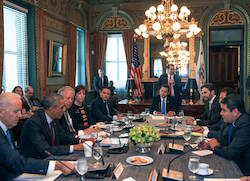El Salvador, Honduras and Guatemala are all facing serious financial constraints that could hinder their ability to carry out reforms to police and judicial institutions and implement new security measures.
In El Salvador, the most violent country in the region, political disagreements have held up a proposal to issue $157 million in bonds in order to finance ongoing “extraordinary measures” targeting gangs.
The governing Farabundo Martí National Liberation Front (Frente Farabundo Martí de la Liberación Nacional –FMLN) has asked congress to approve the bond issuance. But La Prensa Gráfica reports that it remains unclear whether the opposition, which holds a plurality of parliamentary seats, will vote in favor of the proposal due to disagreement within the party.
FMLN representatives have stated publicly that they may seek to raise taxes if the bond measure is not approved.
In Guatemala, Attorney General Thelma Aldana has warned that her office faces an “alarming” financial crisis that has negatively impacted its ability to operate. According to El Periodico, some employees have had to buy basic necessities like printer paper and even toilet paper with money from their own pockets.
Guatemala’s Comptroller General, Carlos Mencos, attributed the problem to a law that requires government agencies to open for competitive bidding purchases valued at more than 10,000 quetzales, or about $1,300. Mencos said his office proposed changes to that law but they have not been approved.
In Honduras, the law that created a special “police purification” commission (pdf) did not assign a budget to that entity, although it did authorize financial authorities to issue bonds to pay for costs incurred.
Revistazo reports that the commission’s work appears to be proceeding apace despite the lack of an official budget, but broad agreement exists among public policy experts that the absence of a formal budget will pose serious problems for long-term planning and implementation of government policies.
InSight Crime Analysis
The Northern Triangle nations of Honduras, El Salvador and Guatemala remain among the poorest in the hemisphere, which means that resource constraints affect a broad range of public policies including in justice and security.
Currently, the government in each Northern Triangle country is promising bold measures to tackle crime and corruption, but their impact will be limited unless the measures are adequately funded.
Although foreign assistance — such as the United States’ $750 million package of largely security focused aid for the region — can help alleviate some of the pressure on public coffers, the Northern Triangle governments ultimately will need to figure out how to fund crucial security and justice initiatives sustainably, and with their own resources.
SEE ALSO: Coverage of Judicial Reform
While this could prove expensive, the negative economic impact of crime and violence on the region can be extremely high. In the long term, increased justice and security expenditures could prove a prudent use of resources.

